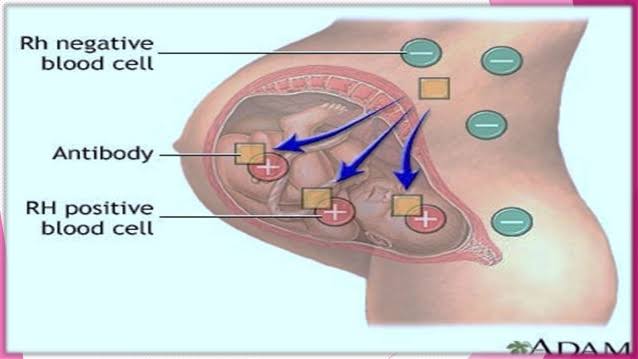HOW IS YOUR BLOOD GROUP AND RHESUS STATUS IMPORTANT IN PREGNANCY? (PART 2)
There are times a mother is rhesus negative and the baby is rhesus positive. This is called rhesus incompatibility.
Remember, a rhesus positive person has rhesus antigens on his/her blood type.
There are times a mother is rhesus negative and the baby is rhesus positive. This is called rhesus incompatibility.
Remember, a rhesus positive person has rhesus antigens on his/her blood type.
...and the body recognises the antigens as part the body.
When you don& #39;t have the antigen on your blood type, but you come in contact with a blood type with the antigens e.g during blood transfusion or childbirth, your body sees it as a foreign body and attacks it.
When you don& #39;t have the antigen on your blood type, but you come in contact with a blood type with the antigens e.g during blood transfusion or childbirth, your body sees it as a foreign body and attacks it.
We are worried during pregnancy if the mother is rhesus negative and the baby is rhesus positive because anytime the baby& #39;s blood enters the mother& #39;s blood stream it would be sensitised, leading to formation of antibodies that will attack the baby& #39;s blood system.
This doesn& #39;t affect the first baby.
In future pregnancies with rhesus positive babies, the antibodies will cross the placenta into the baby& #39;s blood stream and attack the blood cells.
This leads to what is called HAEMOLYTIC DISEASE OF THE NEWBORN.
In future pregnancies with rhesus positive babies, the antibodies will cross the placenta into the baby& #39;s blood stream and attack the blood cells.
This leads to what is called HAEMOLYTIC DISEASE OF THE NEWBORN.
Conditions in which the baby& #39;s blood can enter the mother& #39;s blood system include:
1) Miscarriage after 12 weeks of pregnancy
2) During childbirth
3) Trauma to the abdomen during pregnancy.
4) Any bleeding at all during pregnancy.
1) Miscarriage after 12 weeks of pregnancy
2) During childbirth
3) Trauma to the abdomen during pregnancy.
4) Any bleeding at all during pregnancy.
Prevention.
An injection called RHOGAM is recommended for use.
It is given to the mother before she becomes sensitised to form antibodies that can attack the baby.
It may be given routinely at 28 and 34 weeks of pregnancy or at childbirth (as recommended by your doctor) .
An injection called RHOGAM is recommended for use.
It is given to the mother before she becomes sensitised to form antibodies that can attack the baby.
It may be given routinely at 28 and 34 weeks of pregnancy or at childbirth (as recommended by your doctor) .

 Read on Twitter
Read on Twitter


